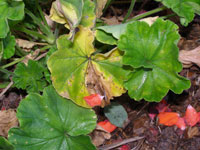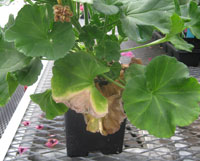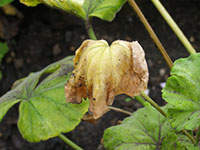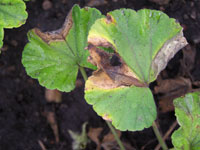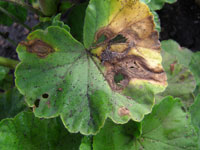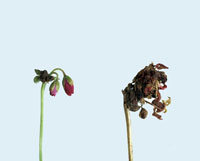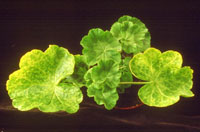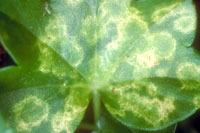Extension > Garden > Diagnose a problem > What's wrong with my plant? > Annuals and Perennials > Geranium > Discolored leaves
Geranium > Leaves > Discolored leaves
1 of 3
Bacterial Leaf Blight
Xanthomonas hortorum pv. pelargonii
(syn. X. campestris pv. pelargonii)
- Round water-soaked spots become tan to brown sunken spots, 1/8 to ¼ inch in diameter
- Leaf spots grow into water-soaked, brown, V-shaped lesions with a yellow border.
- Leaves wilt, turn yellow, than brown. May remain attached to the plant for a week or more
- In severe cases, stems shrivel and turn brown or black
- Common during periods of warm, moist weather
- More information on Bacterial Leaf Blight
2 of 3
Gray Mold
Botrytis cinerea
- Brown spots on leaves with concentric brown rings like a bull’s eye
- Leaf spots can expand to form large brown angular lesions and eventually blight the entire leaf
- Brown blossoms or petals; flowers drop off prematurely
- Gray fuzzy mold develops on rotted tissue under humid conditions
- Disease develops during cool, wet weather
- More information on Gray Mold
3 of 3
Viruses
Cucumber mosaic virus, Impatiens necrotic spot virus, Pelargonium flower break, and Tomato spotted wilt virus
- Leaves may be mottled, deformed, discolored, or have yellow rings
- Leaf veins may turn yellow
- Flowers and leaves may be small or distorted
- Plant may be stunted
- Lab test needed to identify which virus is causing the problem
- More information on viruses



